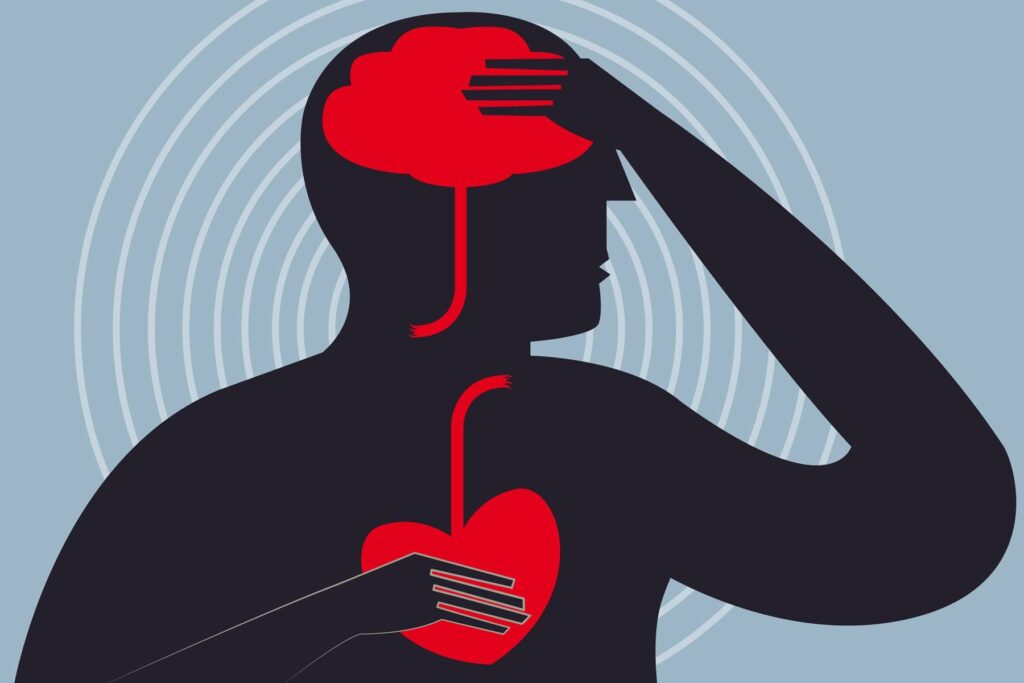Have you noticed moments of forgetfulness, difficulty concentrating, or confusion, especially if you have a history of heart problems? While most people associate memory loss with aging or stress, heart health plays a significant role in maintaining brain function, including memory.
In this blog, we’ll explore how conditions like high blood pressure, heart failure, and poor circulation can affect your ability to remember and think clearly. We’ll also discuss the steps you can take to protect both your heart and brain health. Keep reading to learn how your heart health and memory are more connected than you might think!
Contents
How Heart Problems Impact Blood Flow to the Brain
 The brain relies on a constant supply of oxygen-rich blood to function properly, and the heart plays a crucial role in delivering that blood. When heart problems occur, the flow of blood to the brain can be reduced, leading to various cognitive issues, including memory problems. Here’s how common heart conditions can impact brain function:
The brain relies on a constant supply of oxygen-rich blood to function properly, and the heart plays a crucial role in delivering that blood. When heart problems occur, the flow of blood to the brain can be reduced, leading to various cognitive issues, including memory problems. Here’s how common heart conditions can impact brain function:
1. High Blood Pressure (Hypertension)
-
Hypertension puts extra pressure on blood vessels, which can damage them over time. This damage can restrict blood flow to the brain, leading to memory issues, difficulty concentrating, and other cognitive impairments. Chronic high blood pressure is a significant risk factor for stroke and vascular dementia.
2. Stroke
-
A stroke occurs when blood flow to part of the brain is blocked, often due to a blood clot or burst blood vessel. This lack of blood flow can cause immediate cognitive damage and may result in memory loss, confusion, and difficulty thinking clearly. Stroke survivors may experience long-term memory problems and cognitive decline, depending on the severity and location of the stroke.
3. Atherosclerosis
-
Atherosclerosis is the buildup of plaque inside the arteries, which can narrow and harden the blood vessels, including those supplying the brain. As the arteries become clogged, blood flow to the brain decreases, affecting brain function and potentially leading to memory problems, confusion, and difficulty processing information.
These heart-related conditions can interfere with the brain’s ability to get the oxygen and nutrients it needs to function properly. If blood flow is compromised, memory issues and other cognitive impairments may follow.
Conditions That Link Heart Problems to Memory Loss

Certain heart problems can directly affect your memory and brain function. Here’s how some common heart conditions can lead to memory loss or cognitive decline:
1. Coronary Artery Disease (CAD)
-
When plaque builds up in the arteries that supply blood to the heart, it causes coronary artery disease (CAD). This reduces blood flow to both the heart and the brain, which can lead to memory loss or difficulty concentrating over time.
2. Heart Failure
-
Heart failure occurs when the heart can’t pump enough blood to meet the body’s needs. With less blood reaching the brain, memory problems, confusion, and trouble focusing can develop.
3. Arrhythmias (Irregular Heartbeats)
-
Arrhythmias, like atrial fibrillation (AFib), cause the heart to beat irregularly or too fast. This can disrupt blood flow to the brain, leading to forgetfulness, brain fog, and other memory issues.
4. Peripheral Artery Disease (PAD)
-
Peripheral artery disease affects blood flow to the limbs, but it can also reduce blood flow to the brain. This can cause memory issues and difficulty thinking clearly.
5. High Blood Pressure (Hypertension)
-
High blood pressure damages blood vessels over time, which can affect the brain’s ability to get the oxygen and nutrients it needs. This increases the risk of stroke and dementia, leading to memory loss and other cognitive issues.
These heart conditions affect both your heart and brain health. Managing them well can help protect your memory and keep your mind sharp.
How Poor Heart Health Increases the Risk of Dementia
Chronic heart conditions can play a significant role in the development of vascular dementia and other cognitive disorders. Here’s how poor heart health can affect brain function:
1. Reduced Blood Flow to the Brain
-
When the heart is not pumping efficiently, due to conditions like heart failure or coronary artery disease, blood flow to the brain decreases. Without enough oxygen and nutrients, brain cells can become damaged, increasing the risk of vascular dementia, a form of dementia caused by reduced blood flow to the brain.
2. Damage to Blood Vessels
-
High blood pressure and atherosclerosis (narrowing of the arteries) can cause damage to the small blood vessels in the brain. Over time, this damage can lead to cognitive decline, affecting memory, concentration, and thinking skills.
3. Increased Risk of Stroke
-
Heart problems like arrhythmias (irregular heartbeats) can increase the risk of stroke, which can directly damage the brain and lead to both short-term and long-term memory loss. Repeated strokes or silent strokes (which don’t show obvious symptoms) can cause gradual cognitive decline and lead to dementia.
4. Chronic Inflammation
-
Chronic heart conditions often involve inflammation, which can damage blood vessels and lead to brain injury over time. This inflammation can contribute to the development of vascular dementia and other cognitive disorders.
5. Elevated Risk of Alzheimer’s Disease
-
Poor heart health, especially when combined with factors like high cholesterol or diabetes, can also raise the risk of Alzheimer’s disease, the most common form of dementia. The effects of heart disease on the brain can make it more vulnerable to developing Alzheimer’s symptoms, such as memory loss and confusion.
By taking steps to manage heart health, such as maintaining a healthy diet, regular exercise, and controlling blood pressure and cholesterol levels, you can help protect your brain from cognitive decline and reduce the risk of dementia.
Preventing Memory Loss by Maintaining Heart Health
 The good news is that you can take proactive steps to protect both your heart and your brain. Maintaining heart health plays a critical role in reducing the risk of memory loss and cognitive decline. Here’s how you can improve heart health and safeguard your memory:
The good news is that you can take proactive steps to protect both your heart and your brain. Maintaining heart health plays a critical role in reducing the risk of memory loss and cognitive decline. Here’s how you can improve heart health and safeguard your memory:
1. Exercise Regularly
-
Physical activity helps improve circulation and blood flow, not just to the heart, but to the brain as well. Regular exercise, such as walking, swimming, or cycling, helps maintain a healthy weight, lowers blood pressure, and improves overall cardiovascular health, all of which support brain function and memory.
2. Eat a Heart-Healthy Diet
-
A balanced diet rich in fruits, vegetables, whole grains, and healthy fats (like omega-3 fatty acids) can help maintain heart health and reduce inflammation. Foods like salmon, walnuts, and olive oil are great for both heart and brain health.
-
Limit processed foods, sugary snacks, and excess salt to keep cholesterol and blood pressure in check.
3. Control Blood Pressure and Cholesterol
-
High blood pressure and cholesterol levels are major risk factors for both heart disease and memory loss. Monitoring and managing these factors through lifestyle changes and, when necessary, medication, can significantly reduce the risk of cognitive decline and improve overall health.
4. Quit Smoking
-
Smoking damages blood vessels, reduces oxygen in the blood, and increases the risk of heart disease and stroke. Quitting smoking can improve circulation and brain health, helping preserve memory function.
5. Manage Stress
-
Chronic stress can negatively affect both your heart and brain. Practice stress-relieving techniques such as yoga, meditation, or simply taking regular breaks to reduce your stress levels, which helps protect both heart health and memory.
6. Get Enough Sleep
-
Sleep is essential for heart health and memory consolidation. Aim for 7-8 hours of quality sleep each night. Poor sleep increases the risk of heart disease and cognitive decline, so a regular sleep schedule is crucial for overall health.
7. Stay Mentally Active
-
Just as physical exercise keeps your heart healthy, engaging in mentally stimulating activities—like reading, puzzles, or learning new skills—keeps your brain sharp. Keeping both body and mind active can help prevent memory loss and cognitive decline.
8. Regular Check-ups
-
Regular health screenings are key to identifying and managing risk factors early. Make sure to regularly check blood pressure, cholesterol, and blood sugar levels to stay on top of your heart health and prevent complications that could affect your brain function.
By focusing on heart health, you’re not only protecting your heart but also supporting your memory and overall cognitive health. Small lifestyle changes today can have a lasting impact on your brain and heart health in the future.
When to Seek Medical Help
If you notice frequent memory problems, confusion, or difficulty concentrating—especially if you have a history of heart issues—it’s important to seek medical advice promptly. Early evaluation can help identify if your memory loss is linked to heart health and guide you toward the right treatment.
Don’t ignore these signs. Taking timely action can protect both your heart and brain from further damage.
Click the button below to connect with an experienced online cardiologist at MantraDoc who can assess your heart health and help you maintain your memory and cognitive function.

